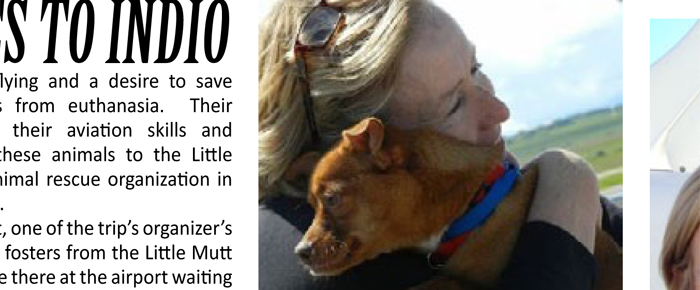
By Janet McAfee
The 18 little passengers readied themselves for the flight ahead. The plane taxied down the runway of the Thermal Airport and then took off into the vast skies toward the Canadian border. The canine passengers on board were quiet, seeming to trust that a better life was ahead, a life where they would not be hungry or homeless again. They seemed to instinctively know that a loving home awaited them in another land where there were not so many unwanted animals in shelters.
The July 15 rescue airlift of Coachella Valley shelter dogs was only the latest in a series of flights shuttling animals from California’s crowded shelters to areas where there is a shortage of adoptables. There was urgency to this particular flight with the dogs from Indio, as the shelter operated by that city is facing an August 31 closure date.
The wings taking these animals to a better life are those of The Wings of Rescue. This volunteer organization’s members have a passion for flying and a desire to save shelter animals from euthanasia. Their pilots donated their aviation skills and aircraft to fly these animals to the Little Mutt Society animal rescue organization in Calgary, Canada.
Lisa Blodgett, one of the trip’s organizer’s explained, “The fosters from the Little Mutt Society will all be there at the airport waiting for the dogs, so the foster parents already know which dog they’re going to get.” This is the seventh shelter animal airlift Lisa helped organize. She is pictured here with Sweetie, a Chihuahua she rescued from Indio and sent on a previous Wings of Rescue flight to Bellingham, Washington. It was hard for Lisa to say goodbye after fostering Sweetie and her puppies. She keeps in touch with the dogs’ Washington foster and emphasizes, “We don’t send the dogs to the unknown. Establishing a relationship with the rescue on the other end is key to the success of these transports.”
How was a transport arranged to another country? Vicki Wright, a Coachella Valley snowbird, returned to her home in Calgary after the winter season and immediately set to work on contacting private Canadian rescue groups about the Indio animals. Vicki volunteered at the Indio shelter, taking lovely photos of their animals to post on Petfinder among other duties. She sent out a series of letters to Canadian animal welfare groups explaining the need in Indio, and the director at Little Mutts responded that they could help with the smaller dogs.
Why Canada? Briefly, they have better programs for spaying and neutering. Canada’s dog population has an abundance of medium and large size animals. California shelters are overwhelmed with Chihuahuas and other small breed dogs they can’t find enough homes for. Most of the animals on the July 15 transport were Chihuahuas, Terriers and Poodle mixes, breeds that are readily adopted across our Northern border.
Jose Mercure, Indio shelter manager, describes the complex three week process required for a successful international transport. The selected animals had to be tested for giardia, and then if found positive, treated for this condition prior to the flight. Desert Dunes Veterinary clinic conducted a health check on each animal, and issued a health certificate. All animals were vaccinated. International microchips were flown overnight from Canada and inserted in each dog. The paperwork was organized and covered in plastic and attached to each crate. Volunteers drove them from the shelter to the Thermal airport. The passengers were given a potty break walk before boarding the first leg of the flight to Boise, Idaho. In Boise, the animals were transferred to a 6-seater jet plane for the final two hour voyage to Calgary.
Vicki Wright was there waiting at the Springback Airport near Calgary with the excited group of foster parents waiting for their animals to arrive. The dogs went through customs, and it was a happy gathering as each dog met the family who would be caring for him. One tri-colored terrier named laFonda snuggled happily under her foster mom’s chin. Vicki is pictured here greeting Bea, a cute reddish colored Chihuahua she came to know well during her volunteering days at Indio.
These lucky dogs were given a second chance by their Calgary guardian angles. They were given a second chance by a group of pilots who decided to become part of the solution. You can read more about this amazing organization at www.wingsofrescue.org.
These animals might otherwise had their lives cut short if they been transferred to the large county shelter system at the end of August. But transports alone aren’t going to solve the homeless pet problem in California. We need to look at the seventy “No Kill” communities in the United States, implement their techniques, and make our public shelters a safe haven for homeless pets.












































